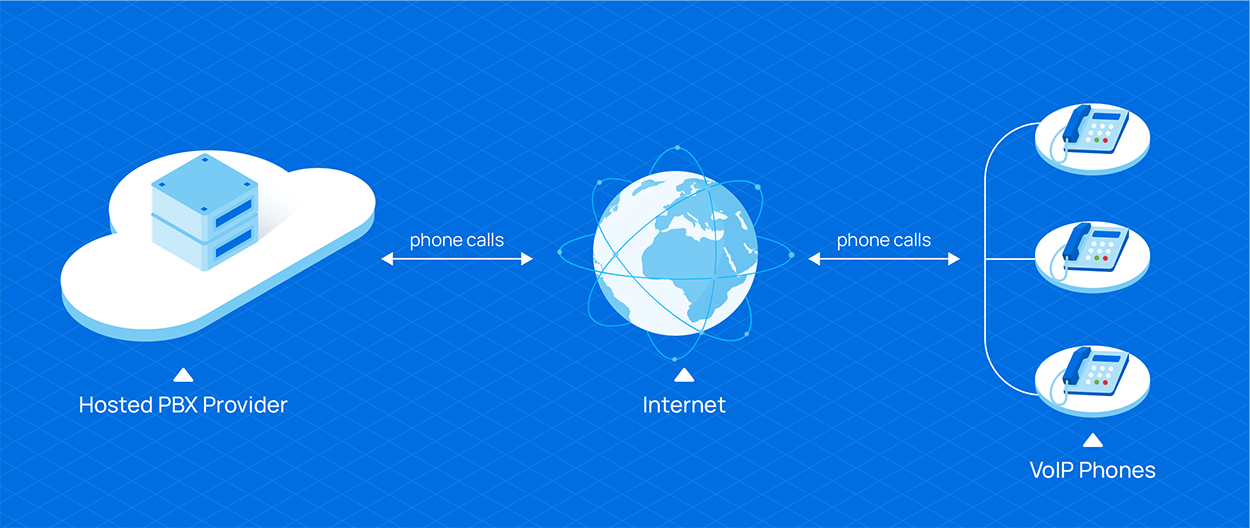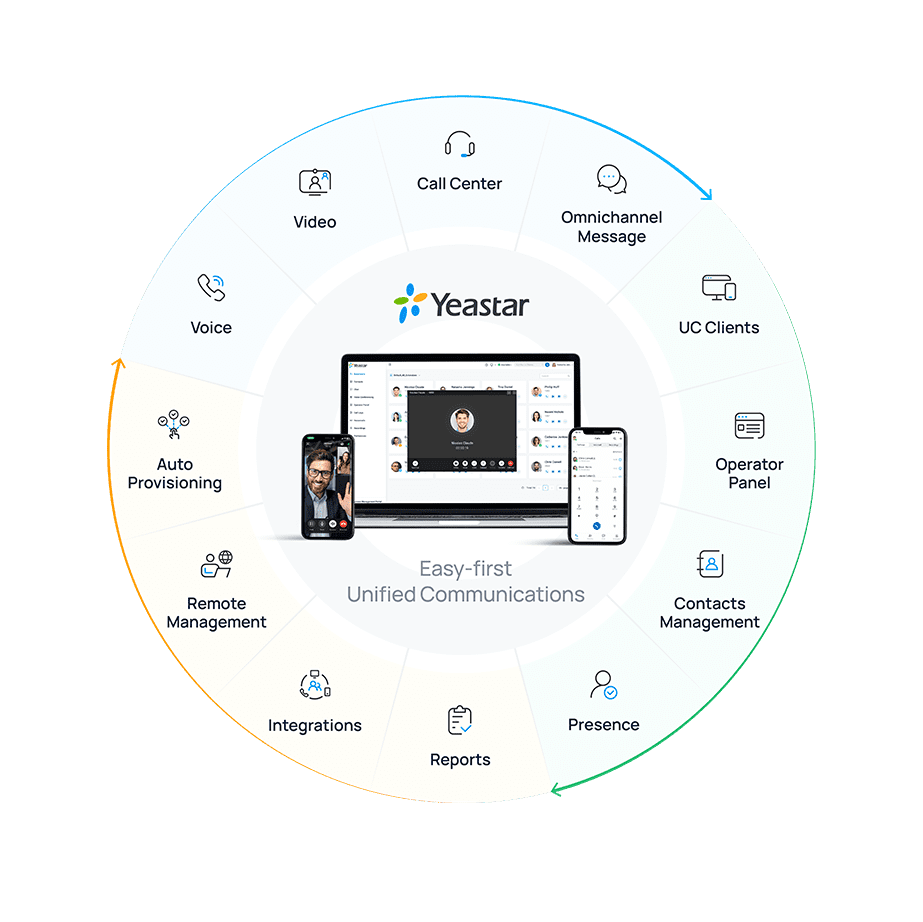 The modernization of business communications at small, medium, and large offices has become a significant matter for many companies. Traditional phone lines remain an important means by which many offices set up their telephone networks. Some of them have long-running contracts they need to fulfill, whereas others simply make use of the infrastructure that is already in place, as they don’t have the funds to upgrade it.
The modernization of business communications at small, medium, and large offices has become a significant matter for many companies. Traditional phone lines remain an important means by which many offices set up their telephone networks. Some of them have long-running contracts they need to fulfill, whereas others simply make use of the infrastructure that is already in place, as they don’t have the funds to upgrade it.
This is where hosted VoIP systems (Also called hosted PBX) come in. If you’re wondering about the pros and cons of hosted VoIP and whether or not this is a phone service that can benefit your business and save you some money, you’ve come to the right place. This article will go through everything you need to know about hosted VoIP phone systems and make an informed decision.
Table of Contents
- What is VoIP? →
- What is Hosted VoIP? →
- How Does Hosted VoIP Work? →
- 4 Benefits of Hosted VoIP →
- Hosted VoIP vs. On-Premise VoIP →
- Hosted VoIP vs. Cloud VoIP →
- Hosted VoIP vs. Hosted PBX →
- Hosted VoIP Systems Key Features →
- Is Hosted VoIP Phone System Right for My Business? →
What is VoIP?
VoIP (Voice over Internet Protocol) allows voice calls via the Internet instead of traditional phone lines and analog phones. It converts your voice into digital signals, breaks them into data packets, and sends them over the internet. The recipient’s device reassembles these packets into the original voice signal for communication.
Here is a short video to help you understand VoIP is in a minute:
What is Hosted VoIP?
Building on the foundation of VoIP, hosted VoIP, also known as Hosted PBX, takes it a step further by outsourcing the management and infrastructure to a service provider.
Hosted VoIP systems provide business communication that does not rely on the on-site hardware but makes use of cloud-based systems to host the telephone network of each particular office. With hosted VoIP phone systems, businesses can enjoy all the benefits of VoIP without the need for on-site hardware, as the provider hosts and maintains the system in their data centers.
Many hosted VoIP solutions enable communication via softphones, allowing start-ups and companies without much capital to get their phone systems up and running without having a single IP phone in the office. It ensures scalability, reliability, and ease of use, making it an ideal choice for businesses looking to streamline their communication needs.
It is particularly beneficial for small to medium-sized businesses that want a professional phone system without the hassle and expense of managing it themselves. It removes the need to spend a lot of money on installing a whole new private branch exchange system (PBX). It allows businesses to focus on their core activities while enjoying a robust and flexible communication solution.
How Exactly Does Hosted VoIP Work?
Hosted VoIP services operate by utilizing a cloud-based infrastructure to handle voice communications. This modern approach allows you to make and receive calls from anywhere with an internet connection, offering unparalleled flexibility. Whether you are in the office, at home, or on the go, you can stay connected seamlessly.
Users connect to the service via IP phones or softphones. IP phones are specialized devices designed for VoIP, while softphones are software applications that can be installed on computers, smartphones, or tablets. These devices and applications convert your voice into digital data, which is then transmitted over the internet as data packets.

Once the voice data is digitized, it travels through the provider’s cloud-based infrastructure. This infrastructure includes a network of servers and advanced network equipment that handles call routing and management. The data packets are directed to their destination, where they are reassembled into audible sounds, allowing for clear and reliable communication.
Hosted VoIP services also come with a range of advanced features that enhance communication efficiency. These can include voicemail-to-email, call forwarding, auto-attendants, video conferencing, and more. The provider manages updates and maintenance, ensuring that the system is always up-to-date and running smoothly.
How Can Your Business Phone System Benefit from Hosted VoIP?
A cloud VoIP phone system is a hassle-free, easy-to-use unified communications solution that will allow your employees to make VoIP calls and even use video conferencing features on a single network by just using their computer or mobile device!
Below, you can find some of the main benefits of hosted VoIP features.
1. Lower Price
This is the most significant factor. Using a traditional, circuit-based phone system can eat away at your company’s finances on a monthly basis. Many phone companies hike up the prices without warning their customers about it.
Choosing a hosted VoIP provider guarantees you the same fixed monthly fee for using their phone system services, with the option of upgrading to a variety of premium packages, should you need to expand your UC capabilities.
2. Additional Features
When you pay a phone company to set up a PBX system that uses traditional PTSN communication technology, you pretty much only pay for the possibility of calling people, answering incoming calls, and using phone extensions and call routing for the telephones within your office.
For that same price (or even less), a hosted PBX system will give you access to a wide plethora of additional, advanced features, such as softphones (a mobile app that makes your smartphone part of the office network), audio conferencing, video calling, presence, instant messaging, and much more.
3. Less Clutter
Setting up an on-premise, business VoIP system usually comes with having to deal with a whole lot of hardware and cables being brought into the office. The same goes for traditional PBX – if you run a small business with limited office space, every square inch matters.
One of the biggest benefits of a hosted VoIP service is the fact that all that unnecessary clutter is hosted on a data center located offsite, and you just need a stable internet connection to use it.
4. Streamlined Office Communications
By using a hosted VoIP phone system, you eradicate the need for complicated call-routing techniques and long waiting times.
All your company’s communication channels will run seamlessly, and with VoIP softphones, you’ll get all the same features as you would with traditional desk phones by simply installing an application on your employees’ computers and mobile devices!
Hosted VoIP vs. On-Premise VoIP
When choosing to go with a business VoIP solution, you’ll likely run into two different ways of providing the same service: hosted VoIP platforms (which are cloud-based) or on-premise VoIP systems.
Hosted VoIP Solution
In the case of hosted VoIP, all the infrastructures that are necessary to carry out your calls are the responsibility of your hosted VoIP provider. They are in charge of maintaining all servers and keeping them functional so that you and your employees can enjoy uninterrupted communications.
Hosted VoIP, on the other hand, is a service provided by a third party that takes on the costs and challenges that come with maintaining VoIP servers. You don’t need any additional equipment to get started, eliminating setup costs entirely. Of course, you’ll need to pay a monthly fee for this kind of service, but it’s significantly smaller than the cost of operating your own on-premise VoIP phone system.

On-premise VoIP Solution
On-premise VoIP, on the other hand, entails your company setting up all VoIP systems inside of the office building (or at another location). This means that you’ll be responsible for installing (and paying for) all the servers needed to maintain the network.
On-premise VoIP is associated with relatively high setup costs. The size and scale of the server infrastructure required to run it depends on the size of your business, but even with a small office, this is anything but a small amount of investment.
Another “hidden” cost involves your IT resources. You’ll probably have to hire a systems administrator to maintain and upkeep all technology and resolve any issues that may arise from time to time.
Hosted VoIP vs. Cloud VoIP
Hosted VoIP and Cloud VoIP are both internet-based phone systems that require no on-site hardware or maintenance. These terms are often used interchangeably, but they have distinct characteristics.
Hosted VoIP refers to a service where a third-party provider manages the infrastructure. The provider typically handles the phone system hardware and software in the cloud. In contrast, Cloud VoIP is a broader term that includes any voice service delivered over the internet, which may offer features beyond traditional phone capabilities.
While both systems reduce the user’s maintenance responsibilities and support remote work, Cloud VoIP usually offers more advanced management tools and flexibility. This allows businesses to adjust their communication needs easily without significant hardware changes. In essence, Hosted VoIP is a type of Cloud VoIP, but not all Cloud VoIP solutions are hosted.
What Are Differences Between Hosted VoIP And Hosted PBX?
Hosted VoIP and Hosted PBX are both cloud-based phone systems, but they serve different purposes.
Hosted VoIP is primarily an internet-based voice communication service that allows users to make and receive calls without needing extensive on-site hardware. It offers basic features like call forwarding, voicemail, and conferencing, all managed by a third-party provider.
On the other hand, Hosted PBX (Private Branch Exchange) is a more advanced solution that includes all the features of Hosted VoIP but adds additional functionalities typically found in traditional PBX systems. This includes call routing, auto-attendants, voicemail-to-email, and more complex call management options. While both systems enhance remote work capabilities and reduce costs associated with traditional phone systems, Hosted PBX provides greater scalability and flexibility. It’s better suited for businesses with more complex communication needs. In summary, if you need a simple voice service, Hosted VoIP may suffice; however, for a comprehensive telephony solution with advanced features, Hosted PBX is the better choice.
Main Features and Capabilities of a Hosted VoIP Phone System
Start-ups and small businesses tend to choose hosted VoIP providers for their business communications, as it is a relatively cheap service with a fixed monthly cost. For bigger corporations with excellent communication infrastructure, on-premise VoIP may be the better long-term solution, as it’ll allow them to retain complete control of their unified communications hardware.
Regardless of which one you think would benefit your company more, all the hosted VoIP phone systems have largely the same features and capabilities, which are:
- Phone Calls
- Auto Attendant
- Call Forwarding
- Call Controls
- Audio Conferencing
- Call Routing
- Call Recording
- Voicemail
- Anonymous Call Blocking
- Call Center

Is Hosted VoIP System Right for My Business?
Determining if Hosted VoIP is right for your business involves evaluating several key factors. Hosted VoIP is particularly advantageous for small businesses and startups due to its cost savings, scalability, and mobility features. By eliminating the need for expensive on-site hardware and maintenance, businesses can significantly reduce their operational costs—often seeing savings of up to 30% on phone bills compared to traditional systems.
The system also allows for easy scalability, enabling you to add or remove users as your business grows without incurring high costs for upgrades. This flexibility is ideal for companies with fluctuating staffing needs or those in growth phases. Additionally, Hosted VoIP supports remote work by allowing employees to make and receive calls from anywhere with an internet connection, enhancing productivity and collaboration
However, it’s essential to consider your internet connectivity. Hosted VoIP relies on a stable, high-speed internet connection; poor connectivity can hinder performance. Furthermore, businesses handling sensitive data should thoroughly vet providers for security practices and compliance with regulations.
Overall, if your business prioritizes cost efficiency, flexibility, and modern communication features, Hosted VoIP could be an excellent fit.
Migrate to a Hosted VoIP Phone System with Yeastar
Upgrade your phone system with Yeastar to modernize and streamline communications. Yeastar’s hosted VoIP solution unifies voice, video, messaging, and customer experience, suitable for organizations of all sizes. This comprehensive approach keeps teams and customers connected, transforming business communications. With thorough training and ongoing support, Yeastar ensures a smooth transition and continuous system improvement.
Recognized as a Leader in VoIP by G2, based on genuine user reviews, Yeastar offers a 30-day free trial with no credit card required. Experience the efficiency and scalability of Yeastar’s communication system firsthand.



I have sold several devices of the call center and installed and set them up. They have very good facilities and reasonable prices in Iran. I am satisfied. If the trainings can be present, it will be very good. Thank you.Yeastar very good